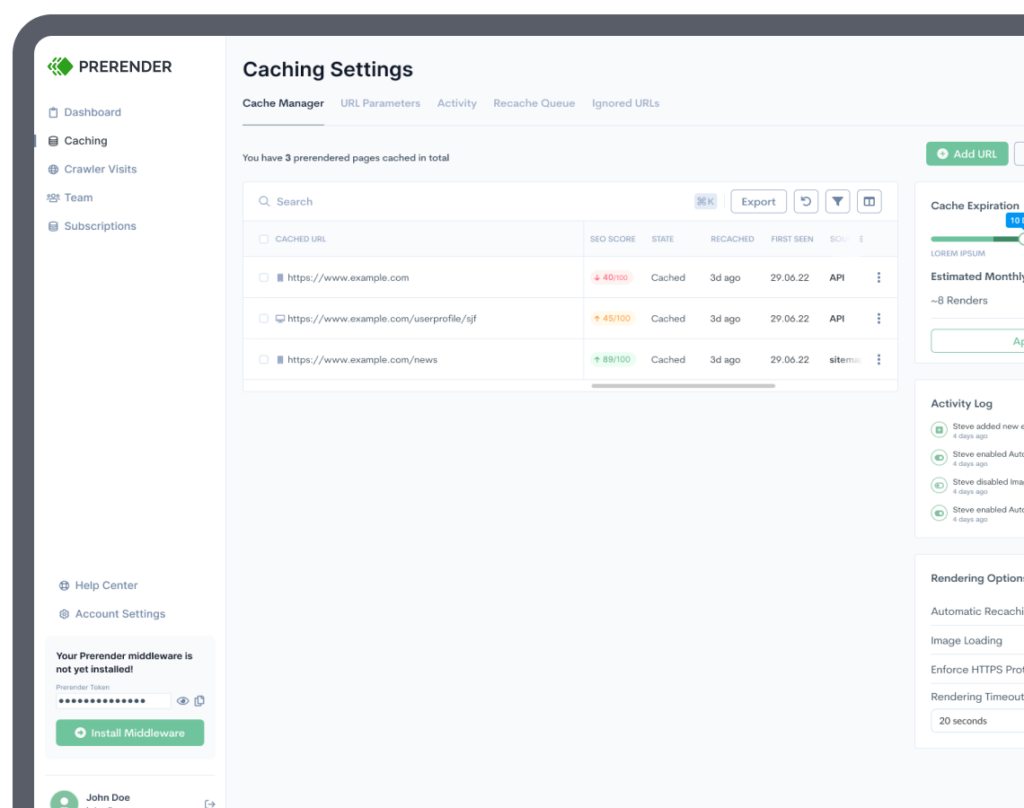SEO for marketplace platforms presents distinct challenges. While foundational SEO aspects such as backlinks and site speed retain their significance, the intricate technical SEO framework of marketplace websites introduces additional complexities. These include managing dynamic product listings and navigating intricate internal search functionalities.
To optimize your marketplace SEO for enhanced search visibility, we’ll delve into key hurdles specific to marketplace JavaScript SEO and propose effective strategies to address them.
Creating Hierarchical Site Architecture
Site architecture encompasses two things: content organization and internal link relationship. Due to the thousands of vendors, products, and their variants hosted in a marketplace, marketplace website architecture is often disorganized. As a result, it can cause confusion for search ens when crawling and indexing the pages, negatively affecting the SERP rankings of the marketplace.
SOLUTION
An optimized site structure should look like the illustration below.
Here are some best practices to achieve a clear-cut site structure:
- Create standards: employ clear, logical naming conventions for all content formats and product pages.
- Descriptive anchor text: instead of “click here,” use targeted, descriptive anchor text to connect relevant pages. For instance, “see the product specifications.”
- 3-click rule: important pages should be 3 clicks (maximum 5 clicks) away from the home page to help both users and search engines easily find the product or content.
- Clear URLs: structure your URL architecture to make product relationships understandable. For example, domain.com/category/sub-category/product-name signals a product’s precise positioning in the site’s hierarchy.
Debugging JavaScript SEO Indexation Issues
With product inventory continuously changing (new and sold items), product page URLs are frequently added and deleted. This constant flux of dynamic content can overwhelm search engine crawlers, leading to excessive crawl budget usage and poor JavaScript SEO indexation performance. Consequently, numerous product pages on marketplaces remain undiscovered, resulting in zero sales for the merchants.
Related: Discover what crawl budget is and its roles in improving your SERP rankings.
SOLUTION
There are several technical SEO solutions to combat this problem:
- Leverage robots.txt directives
You can allow search engine bots to crawl and access non-sensitive pages by using disallow rules. Also, ensure crawlers can access common extensions like .html, .php, and .aspx on your website, as this helps facilitate the crawling of heavy directories like /category/ or /product/.
Learn more about how to use robots.txt properly in this beginner’s guide.
- Add meta-robot tagging
Only use noindex for pages not needing indexing, like the order confirmation pages or user dashboards. Employ nofollow to untrusted partner links to avoid manipulative SEO. Furthermore, consider using noarchive on sensitive legal pages. Most importantly, never block entire site sections from being indexed unless necessary.
- Submit XML sitemaps frequently
Consistently updating your XML sitemaps serves not only to list new products but also to actively signal them to search engines. Prioritize recently modified pages by listing them first based on their lastmod date. This nudges crawlers to index your freshest pages efficiently.
For massive inventories exceeding 50,000 URLs, break down your sitemaps by product category. This improves clarity and parsing for search engines. Remember to ping major search engines whenever you submit or update your sitemaps to keep them informed of your dynamic content.
Increasing Core Web Vitals (CWVs) Scores
As Google continues rolling out its Page Experience updates, site speed, page responsiveness, and user experience metrics are transforming into key technical SEO ranking factors. Specifically, the Core Web Vitals (CWVs) – comprising the Largest Contentful Paint (LCP), First Input Delay (FID), Interaction to Next Paint (INP), and Cumulative Layout Shift (CLS) – now actively influence search visibility and traffic.
Top tip: Learn more about Core Web Vitals, what each component entails, and their roles as ranking factors in this guide.
For marketplaces dealing in dynamic product inventory, delivering excellent Core Web Vitals poses meaningful challenges because:
- Excessive page weight from images and apps hamper LCP
- Complex JavaScript can slow time-to-interactive
- Product data streaming in lazily causes layout shift
SOLUTION
Although technical SEO optimization techniques like code minification, image optimization, and resource prioritization can go a long way to boost CWVs, the most sustainable way is by implementing dynamic caching using a JavaScript SEO tool like Prerender.
Our dynamic pre-rendering solution accelerates page response times (under 50 milliseconds) for users and crawlers alike. We generate optimized static HTML versions of your JavaScript pages ahead of time and feed them to search engine crawlers as requested. As for human requests, they will be directed through the normal server route. This way, both Googlebot and users can enjoy a fast and highly responsive shopping experience on your marketplace websites.
Learn more about how Prerender works and all the benefits you can expect from adopting this enterprise SEO tool.
Improving Mobile Crawlability and Friendliness
Modern search is mobile-driven. Yet, browsing and purchasing products through the mobile version of your marketplace website are often unpleasing. Common mobile friendliness pitfalls damaging marketplace search visibility include:
- Bloated navigation menus: deeply nested side-drawer navigation menus may work on desktops but prove unusable on mobiles, hindering crawlability.
- Redirect chains: multiple unnecessary redirects and chained 301s lead bots and users astray, causing failed crawls, lost rankings signals, and frustrations.
- Intrusive pop-ups: Pop-ups often annoy customers, obstruct search bot indexing attempts, and negatively impact UX and indexing efforts.
SOLUTION
To unlock strong mobile marketplace SEO, you must engineer tap-friendly, streamlined mobile experiences shaped by:
- Simplified information architecture (AI): seamless mobile browsing through minimal, intuitive taxonomy and tray menus.
- Seamless redirects: maintain direct single-hop redirects using correct status codes.
- Lightweight markup: use compressed HTML, CSS, and JS to optimize mobile bandwidth.
- Continuous testing: fix defects on real mobile devices via tools like Google Search Console’s Mobile Usability Report.
Increase Product’s Search Visibility Through Optimized Marketplace SEO
Filled with thousands of dynamic content, optimizing marketplace SEO presents unique challenges to SEO managers. And when the marketplace website is built with JavaScript, the complexity intensifies.
To get the best results of your SEO efforts, your on-page SEO optimization must be supported by technical SEO elements. Following these 5 marketplace SEO guidelines should help you significantly improve the search visibility of your product pages.
That said, manually optimizing each facet here can be overwhelming. To solve these common marketplace-JavaScript SEO issues more sustainably, adopt Prerender.
By generating snapshots of your JavaScript-heavy content, Prerender enhances indexing performance, Core Web Vitals scores, and mobile-friendliness. Additionally, you can enjoy Prerender’s website checker—a built-in SEO checker alerting you to any areas of your page that require further SEO optimization.
Get started with Prerender today and enjoy 1,000 free renders per month!



